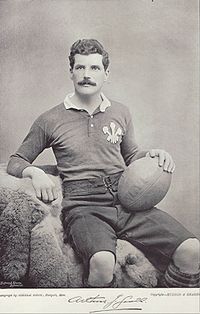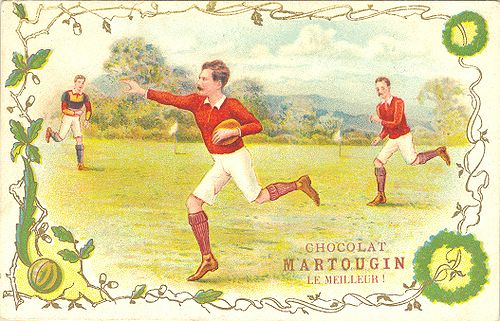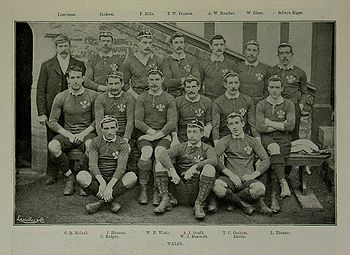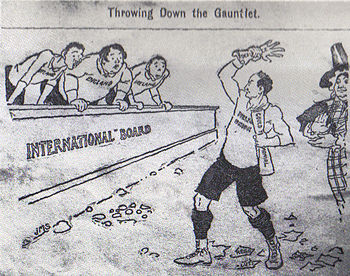- Arthur Gould (rugby player)
-
Arthur Gould 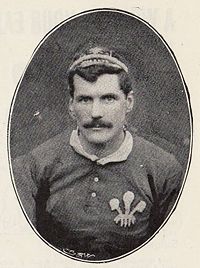
Arthur Gould Full name Arthur Joseph Gould Date of birth 10 October 1864 Place of birth Newport, Monmouthshire Date of death 2 January 1919 Place of death Newport, Monmouthshire Height 179 cm (5 ft 10 in) Weight 70 kg (11 st 0 lb) Notable relative(s) Bob Gould (brother)
Bert Gould (brother)Occupation(s) public works contractor
brewery representativeRugby union career Playing career Position Full back
CentreAmateur clubs Years Club / team 1882-1898
1885-?
1886-87
?
1887-88
?Newport RFC
London Welsh
Richmond F.C.
Southampton Trojans
Middlesex
HampshireNational team(s) Years Club / team Caps (points) 1885-1897 Wales 27 (13) Arthur Joseph "Monkey" Gould (10 October 1864 – 2 January 1919)[1] was a Welsh international rugby union centre and full back who was most associated as a club player with Newport Rugby Football Club. He won 27 caps for Wales,[2] 18 as captain, and is considered the first superstar of Welsh rugby.[3][4][5] Gould led Wales to the country's very first Home Nations Championship and Triple Crown titles in 1893; defining himself as a great player and captain in the match against England during the same tournament. Towards the end of his career Gould was at the centre of a controversy which saw Wales withdraw from international rugby for 12 months.
Gould was the most capped Welsh centre until Steve Fenwick of Bridgend beat the record at Lansdowne Road on 15 March 1980. He played 27 times for Wales, twice at full back and 25 at centre, ending his career against England on 9 January 1897. This last game was played in front of 17,000 supporters at Rodney Parade; Wales won 11–0. It was the 18th time Gould had captained Wales and this record stood until broken by Ieuan Evans in 1994.
A superb all round player and even-time sprinter with swerve, Gould could side-step and kick with either foot. He never ceased to practise to develop his fitness and skills. He was considered the outstanding player of his time.[6]
Contents
Early years
Gould was born into a sporting family in Newport in 1864.[7] His father, Joseph, had moved to Newport from Oxford to work in the brass foundry business, and was himself an ardent sportsman playing for the local cricket team.[7]
His five brothers were all notable rugby players and athletes. Gould's brother Bob was a forward who captained Newport during the 1886–87 season and played 11 times for Wales, once as captain versus Scotland in 1887. A younger brother, Bert, was a centre who played three times for Wales including in the same Welsh team as Gould that won the Triple Crown for the first time in 1893. His other brothers were Harry,[8] Gus[9] and Wyatt,[10] and all three played rugby for Newport. Wyatt captained Newport in 1905–06 and Harry was present in the first season 1875–76. There was at least one of the six brothers in the Newport team for the club's first 29 seasons and Wyatt played until 1907. Wyatt also represented Great Britain in the 400m hurdles in the 1908 Summer Olympics at White City, London.[11]
From a young age Gould was known to all as 'Monk', taken from his childhood nickname 'Monkey' because of his youthful passion for climbing trees.[12] Gould, like his brother Wyatt, was a keen athlete and made money during his years as a rugby player by entering track and field meets.[13] He finished third in the AAA 120 yard Hurdles in 1887 and 1893.[11]
Rugby career
Club history
At the age of fourteen Gould captained the Newport Junior team, and later played a few games for the Third XV, Newport Rugby Club's second reserve side, and was the replacement for the regular full back. Gould was drafted into the First XV, the senior team, as an emergency full back at the age of eighteen.[7] On the 18 November 1882 Newport had a fixture against Weston-super-Mare at Rodney Parade. The Newport groundsman, John Butcher, had been sent by the club to collect the regular full back who hadn't shown for the game.[14] Gould saw Butcher waiting outside the full back's home and approached the groundsman to discover that the player was at a funeral. Butcher offered Gould the position instead and he successfully persuaded the club to play him.[14] Gould had a 'fairy-tale' start for his club, running in two tries, against his captain's wishes, as Charlie Newman kept shouting for Gould to "Kick, kick!". Gould was never dropped from the Newport First XV from that day.[7] In his fourth season he was moved up to play as a three-quarter. Gould played for Newport RFC for sixteen years, from 1882–1898.


Gould in Newport club jersey As there were no professional rugby players in Wales, Gould and his brother Bob, travelled Britain working as public works contractors.[13] During this time he entered open athletic meets and played for varying English rugby teams including the Southampton Trojans and from 1887 was a regular member of the Richmond team.[7] In 1885, Gould was invited to play for the newly formed Welsh exiles team London Welsh. Until this time there had already been in existence a London Scottish F.C. (founded 1878), to look after the interests of Scottish players working or studying in London, but it took another seven years for the Welsh team to be formed. The very first game, a trial match, was played on 21 October 1885 at Putney, and three days later the first team took to the field at the Saracerns Ground in Walthamstow against London Scottish.[15] Gould played at half-back, and was joined by Martyn Jordan, Thomas Judson, Rowley Thomas, Charles Taylor and T. Williams; all of whom were or would become Wales international players.[15] During the 1885/86 season London Welsh were invited to make up an 'exiles' team, along with players from London Scottish, to face a London XV in a charity match at The Oval. Gould was one of six Welsh players selected to play in front of an impressive crowd of 8,000 and in the presence of the Prince of Wales.[16]
Gould's scoring record at Newport 1891 - 1897 Season Tries Drop goals Points 1891–92 31 7 121 1892–93 37 4 127 1893–94 17 8 83 1894–95 15 1 49 1895–96 17 5 71 1896–97 7 9 57 Despite his strong associations with Newport, between 1885 and 1890 Gould played no more than a handful of games for the Welsh side, playing almost all his club rugby in England.[17]
In June 1890, Gould left Britain to complete a works contract in the West Indies, but returned to Newport in time to begin the 1891/92 season,[17] in which the club failed to lose a single match, now known as the team's 'invincible' season.[18] Gould captained Newport in 1893–94, losing only 3 games, and again during the 1894–95 season when the club lost only to Llanelli, 6–8, in an away game. During the 1893-94 season Gould scored 37 tries during 24 games, a club record that stands over a hundred years later.[19]
No accurate records are available until 1886, but from 1887–1898 Gould scored 136 tries and dropped 42 goals for Newport.
International career
1885–1889
Gould was first capped for Wales for the opening game of the 1885 Home Nations Championship, played against England. Under the captaincy of Newport team-mate Charlie Newman, Gould was brought in at full back, at the time his preferred club position. This was the fourth encounter with England, and only the eighth Welsh international rugby game, and Wales lost the match by a goal and four tries to a goal and a try. Both Welsh tries came from London Welsh wing Jordan, and some accounts credit the goal conversion to Charles Taylor,[20] though it is now generally acknowledged to Gould.[21] Gould was re-selected for the second game of the tournament, a draw away to Scotland, which saw both teams play brothers at back and forwards positions; George and Richard Maitland for Scotland and Gould and Bob for Wales.
The next season Gould had switched from full back at Newport, to the threequarter position; and this tactic was accepted by Wales, with Gould coming in at centre in place of Cardiff's Frank Hancock. The 1896 Championship began with another Welsh loss to England, but the second game, against Scotland was an historic rugby match despite ending in another Welsh defeat. In 1884, Cardiff are acknowledged as being the first club to adopt the four threequarter system,[22] dropping the ninth forward to include a second centre in the threequarter positions. Hancock along with Tom Williams were the first two double centres, when the tactic was employed to enable both men to play at once.[14] The four threequarter system began slowly spreading throughout Wales, a nation noted for its more exciting back play. Newport was reluctant to adopt this style of play, mainly due to Gould's excellent kicking and covering abilities, which allowed the club to continue with the advantage of the extra forward.[23] The 1886 Scotland encounter saw Wales become the first country to trial the four threequarter system when they brought in Hancock as captain, playing at centre alongside Gould. The experiment was a sporting disaster, with the Welsh forwards being poorly chosen to cope with the nine Scottish forwards.[17] Hancock reacted by regrouping the team at half-time and readopting the standard formation, bringing Harry Bowen from full back into the pack, and pushing Gould from centre into Bowen's vacant position.[24] The system was deemed a failure and Hancock never represented Wales again, though the whole affair had a negative effect on Gould, who is said to have provoked an abhorrence to the four threequarter system for the rest of his career.[24] Gould even went as far as persuading the Welsh selectors to revert to the old formation.[25] The next time Wales trialed the system was in the 1888 encounter with the touring New Zealand Natives, a match in which Gould was unavailable to play.[25]
The next season saw Wales complete their first full Home Nations Championship, with Gould playing as the lone centre in all three games. It was a fairly successful Championship for the Welsh, with a draw, a win and a loss, leaving them second in the table.[26] Of note during the series, was Bob Gould's captaincy in the second match, against Scotland, and Gould's first ever international dropped goal, gaving Wales the win over Ireland, which made up for him missing a dropped goal by just a yard in the draw against England.[27] Due to work commitments, Gould only played in one of the two Wales games of the 1888 Home Nations Championship, the first victory over Scotland, thanks to a single try from Thomas Pryce-Jenkins.[28] In the second game, played away to Ireland, George Bowen was given the centre position in the last match Wales would play with a three threequarter system. Gould then missed the first Welsh international against an overseas touring side, when the New Zealand Natives were beaten at St. Helen's in Swansea, and was still absent two months later for the opening game of the 1889 Championship, but returned for the clash with Ireland. On his return Gould was given the captaincy of the Welsh team, and found himself playing alongside Llanelli centre Tom Morgan.[29] It was not the best of starts for Gould's captaincy, losing by two tries to nil at home, but would be the first of 18 caps in which Gould would lead out his country, a record that stood for almost a century.[30]
1890–1893
Gould played all three matches of the 1890 Home Nations Championship, partnered at centre for the three games with Dickie Garrett, a coal tipper who played for Penarth.[31] Gould lost the team captaincy for the first match to Frank Hill,[32] a game which Wales lost to Scotland 5-1; though Gould scored the only Welsh points of the match with his first international try. The game is also notable for being the first appearance of Welsh sporting legend Billy Bancroft, the Swansea all-round sportsman would take over the captaincy from Gould on his retirement, and was Gould's full back for his next 18 international games. Gould regained the captaincy for the next game, an encounter with England at Crown Flatt in Dewsbury, and from that point held the captaincy whenever he represented Wales. The encounter was an historic day for Wales, with the country's first win over England, a single try from Buller Stadden giving Wales the victory. The campaign ended in a disappointing away draw with Ireland, which saw the introduction of Tom Graham, a Newport forward who would become Gould's club captain during the 1891/92 'invincible' season.[33]
Gould misses the entire 1891 campaign as he and his brother Bob, had gone to the West Indies to conduct civil engineering work.[34] On Gould's return he regained his international place and the captaincy for the 1892 Championship and was rejoined at centre by Garrett. This was a dire campaign for the Welsh team, losing all three matches for the first time in the country's history. There was little consistency for Gould at centre, with three different partners in each of the matches; Garret against England, Conway Rees at home to Scotland and in the Irish encounter, his younger brother Bert. The 1892 Championship is often best remembered for the unpleasant aftermath of the Wales vs. Scotland encounter, which was played in Swansea at St. Helen's. Wales had lost the game 7-2, and some members of the crowd attacked the match referee Jack Hodgson at the end of the game, upset at some of his decisions. The assailants by-passed the police and the referee had to be rescued by some of the Welsh players. Gould himself was struck on the chin,[35] and it was reported that Hodgson only reached the Mackworth Hotel as Gould accompanied him on the coach.[36]
The 1893 Home Nations Championship was in stark contrast to the previous year for the Welsh, with Wales winning not only the Championship for the first time, but also winning the Triple Crown and Gould being the first Welsh captain to lead his team to these achievements.[37] The first match of the campaign was against England.[38] Played at the Cardiff Arms Park, the pitch had been kept from freezing over the night before by 500 braziers being employed across the playing field.[39] This led to a slippery ground, with conditions further hampered by a strong wind.[40] The English team played the first half with the wind behind them and their nine-man scrum dominated the smaller Welsh pack. At half time Wales were 7-0 down, with tries from Frederick Lohden and Howard Marshall and a conversion from England captain A.E. Stoddart. The second half started poorly for Wales, with Marshall scoring a second try from excellent English forward pressure.[41] The game turned not long after Marshall's try. The English forwards could not maintain the pace they had set in the first half of the game, and began to slow.[41] Then Welsh forward Charles Nicholl broke through a line-out with the ball, transferred it to Hannan, who passed to Gould at the half way line. Gould evaded both Alderson and Lockwood before outpacing Field to score beneath the posts.[41] Bancroft converted. A near identical move resulted in Conway Rees then releasing Cardiff wing Norman Biggs who scored with a run from the half-way line, though this time the conversion missed. The Welsh backs continually exposed the three threequarter system, as once the Welsh backs broke through the pack there was little cover to prevent run away scores. With the score at 7-9 to England, Marshall extended the lead with his third try of the match. This gave England an 11-7 lead with only ten minutes remaining. The game swung again when Percy Phillips took a swift heeled ball and passed to Gould.[41] Gould broke through the English defence and scored, though again Bancroft missed the conversion. With further Welsh pressure, a penalty was awarded to Wales on the English 25 yard line, but at a wide angle. Accounts differ as to what happened; some say that Gould tried to place the ball for Bancroft, but failed on the frozen ground,[41] other state that Bancroft defied his captain to take the penalty as a drop kick,[42] while other accounts mention Bancroft and Gould arguing on the pitch before Bancroft's attempt.[43] Whichever event, Bancroft kicked the penalty, the first penalty to be scored in an international match.[44] It was the final score of the game and Wales were victorious, by twelve points to eleven.[45]
At the final whistle the pitch was invaded by Welsh fans and Gould was carried shoulder-high back to the Angel Hotel, cheered all the way by supporters.[46] It was a defining moment for the Welsh style of play[47] and the next season England adopted the four threequarter system.
Gould continued to captain the Wales team through victory over Scotland, with tries coming from Bert Gould, Biggs and McCutcheon; all resulting after presicion handling from the backs.[46] This left the final encounter with Ireland, played at Stradey Park in Llanelli, as the deciding match for a Welsh Triple Crown. A crowd of 20,000 watched an unconvincing display from Wales,[48] which was won by a single try from Bert Gould. Despite the poor performance, the crowd was enthusiastic and celebrated the Welsh victory.[48]
1894–1897
The 1894 Championship began with a poor loss for the defending champions, in a game which saw Welsh in-fighting give the result to their opponents, England.[49] Gould had requested before the game started that he wanted the pack to heel the ball back quickly in the scrums, to give the backs quick ball to allow them to run at the English. Frank Hill decided that this was the wrong option and put all his might into wheeling the scrums instead, which worked against the efforts of Jim Hannan, who was desperately trying to follow his captain's wishes.[49] The next two matches, Gould was partnered by Dai Fitzgerald in a win over Scotland, but was unavailable for the encounter with Ireland and was replaced by Jack Elliott from Cardiff RFC.
By 1895 the only backs remaining from the 1893 Championship-winning team were Bancroft and Gould. Gould was now partnered with Owen Badger, who kept his place for the whole campaign. With the other teams adopting the Welsh style of play, Wales lost their advantage, and the livelier English forwards outplayed their Welsh counterparts to give England victory in the opening game of the 1895 Championship.[49] This was followed by a narrow loss to Scotland at Raeburn Place and a narrow win over Ireland at the Cardiff Arms Park.
1896 was Gould's last full international tournament. The Championship started badly, with a crushing defeat by England, in a game that saw Wales reduced to 14 men after Badger broke his collar-bone in the first 15 minutes.[50] In the second game Wales beat Scotland 6–0, with a try each for Gould and Cliff Bowen. The final game of the Championship was an away loss to Ireland, in which Gould scored his last international points with a dropped goal. At the end of 1896 Gould decided to retire from rugby.[17]
In 1897, Gould was enticed out of retirement for one last Championship.[51] By now Gould was a household name throughout Britain, as much due to his personality and good looks as his brilliant centre play;[52] and a testimonial fund had been started with contributions being made by the public. This caused a stir from the other Home Unions as it was seen as an attempt to pay Gould for playing, and as such was professionalism. As the arguments continued, Gould played his final international game, a solid 11–0 win over England. Wales played no further matches that season after the events behind Gould's testimonial fund caused Wales to leave the International Rugby Board, in a situation now referred to as "The Gould Affair".
International matches played
Wales[53]
Gould's international appearances for Wales 1885 1886 1887 1888 1889 1890 1891 1892 1893 1894 1895 1896 1897 England X X X X X X X X X X Ireland X X X X X X X Scotland X X X X X X X X X X The Gould Affair
In 1896 Gould had played more first class matches, scored more tries and dropped more goals than any other player on record. This led to South Wales Argus journalist W.J. Townsend Collins, to write in the paper:
“ ...as Arthur Gould is as pre-eminent in football as W. G. Grace is in cricket, the footballing enthusiasts of Wales might recognise his services to the game ... by some national testimonial[54] ” Welsh shipbroker, W.J. Orders, organised a collection fund on the floor of the Cardiff Coal Exchange and floated a public testimonial of one shilling.[54] The national response was massive and within weeks the total was into hundreds of pounds. This drew the Welsh Football Union into a confrontation with the International Football Rugby Board, as rule 2 on professionalism stated that no player is allowed to receive money from his club or any member of his club for services rendered to football.[54] The fund being raised by the people of Wales could be seen as a professional fee to Gould making him henceforth ineligible to play for his country. The WFU argued that the money raised was not given by the club but an outpouring of thanks from the Welsh public to a national hero.[55]
By April 1896 the Welsh Football Union had sanctioned a subscription of 1000 shillings from funds for the Gould testimonial. The Rugby Football Union complained and the IFRB reacted by informing the WFU that only a gift of plate up to the value of a hundred pounds sterling could be given to Gould, with the rest of the fund being donated to charity;[56] or Wales would lose their international fixtures. The WFU stood down and withdrew their subscription. The reaction in Wales was one of anger, with the people feeling that the WFU had bowed to English pressure[55] and had been bullied into a decision against the people's wishes. There was also a feeling from other national unions, that the monies may be given to Gould after he had retired from rugby.[55]
In February 1897 the WFU wrote to the IFRB and withdrew their membership, in a move that was seen as an act of hurt pride but also as a manoeuvre to appease the Welsh supporters.[55] The WFU then reinstated their subscription to Gould. On Easter Monday 1897 a banquet was arranged at Drill Hall in Newport. Civic and sporting worthies were in attendance to witness Sir John Llewellyn, president of the WFU, present Gould with the title deeds of a gift house, Thornbury in Clytha Park, Newport.[57] The 250 guests, which included D. A. Thomas,[58] were joined by a reed and string orchestra, the band of the Fourth Battalion of the South Wales Borderers and galleries packed by members of the public.[57]
From February 1897 Wales could not field an international team until the IRFB, supported by the RFU,[59] recommended that Wales be readmitted into the organisation in February 1898. The WFU agreed that they would in future abide by all IRFB by-laws and Gould was not allowed to play in any future international games. Gould accepted the ruling but returned to rugby as a referee[4] and Welsh international selector.[60]
Later life
After retiring from rugby, Gould became a brewery representative around Newport. He was still a very popular figure and would be followed during his work by fans, and his image was still worth money, appearing on merchandise such as cigarette cards and matchboxes.[7]
Gould died at the age of 54. He became ill at work and was rushed home, he died of an internal haemorrhage.[30] His funeral was reported as the biggest ever seen in Wales, until almost 30 years later when David Lloyd George died.[30] Gould was buried at St Woolos Cemetery, Newport.
In June 2007 he was inducted into the Welsh Sports Hall of Fame;[61] 15 of Gould's family were in attendance including his granddaughter Mary Hailes, niece Helen Chubb and nephew Fraser Gould (daughter and son of brother Edward Wyatt Gould).
In Royal Gwent Hospital in Newport, the Arthur Gould Memorial Bed was donated, inscribed: "To the memory of Arthur Gould – Greatest of Rugby Football Players"; though the donation was lost when the portion of the hospital the bed resided in was demolished.[30]
Bibliography
- Davies, John; Jenkins, Nigel (2008). The Welsh Academy Encyclopaedia of Wales. Cardiff: University of Wales Press. ISBN 978-7083-1953-6.
- Godwin, Terry (1984). The International Rugby Championship 1883-1983. London: Willows Books. ISBN 000218060X.
- Griffiths, John (1987). The Phoenix Book of International Rugby Records. London: Phoenix House. ISBN 0460070037.
- Griffiths, John (2000). Rugby's Strangest Matches. Robson Books. ISBN 1861053541.
- Jenkins, John M.; et al. (1991). Who's Who of Welsh International Rugby Players. Wrexham: Bridge Books. ISBN 1872424104.
- Jones, Stephen; Paul Beken (1985). Dragon in Exile, The Centenary History of London Welsh R.F.C.. London: Springwood Books. ISBN 0862541255.
- Lloyd, John Edward; Jenkins, R.T. (1958). The Dictionary of Welsh Biography Down to 1940. Cardiff: William Lewis.
- Parry-Jones, David (1999). Prince Gwyn, Gwyn Nicholls and the First Golden Era of Welsh Rugby. Bridgend: seren. ISBN 1854112627.
- Richards, Alun (1980). A Touch of Glory: 100 Years of Welsh Rugby. London: Michael Joseph. ISBN 071811938X.
- Smith, David; Williams, Gareth (1980). Fields of Praise: The Official History of The Welsh Rugby Union. Cardiff: University of Wales Press. ISBN 0-7083-0766-3.
- Thomas, Wayne (1979). A Century of Welsh Rugby Players. Ansells Ltd.
References
- ^ Arthur Gould player profile Scrum.com
- ^ "Newport Gwent Dragons: Past player profiles". www.newportgwentdragons.com. 2008. http://www.newportgwentdragons.com/Personnel.aspx?pr=106613. Retrieved 2008-06-06.
- ^ Smith (1980), pg 68.
- ^ a b Davies (1999), pg 327.
- ^ Parry-Jones (1999), pg29.
- ^ Smith (1980), pg 68-69.
- ^ a b c d e f Smith (1980), pg 69.
- ^ Harry Gould player profile blackandambers.co.uk
- ^ Gus Gould player profile blackandambers.co.uk
- ^ Wyatt Gould player profile blackandambers.co.uk
- ^ a b The OlyMADMen (2008-03-18). "Wyatt Gould". sports-reference.com. http://www.sports-reference.com/olympics/athletes/go/wyatt-gould-1.html. Retrieved 2009-09-14.
- ^ Parry-Jones (1999), pg43.
- ^ a b Smith (1980), pg 70.
- ^ a b c Thomas (1979), pg 11.
- ^ a b Jones (1985), pg6.
- ^ Jones (1985), pg 8.
- ^ a b c d Thomas (1979), pg 12.
- ^ The 1891-92 season historyofnewport.co.uk
- ^ A Brief History of Newport RFC 1874 - 2005 blackandambers.co.uk
- ^ Godwin (1984), pg 10.
- ^ Home Nations - Swansea, 3 January 1885 Scrum.com
- ^ Davies, D.E. (1975). Cardiff Rugby Club, History and Statistics 1876-1975. Risca: The Starling Press. p. 26. ISBN 0950442100.
- ^ Smith (1980), pg 71.
- ^ a b Griffiths (1987), pg 4:4.
- ^ a b Smith (1980), pg 62.
- ^ Godwin (1984), pg 15.
- ^ Griffiths, John (1982). The Book of English International Rugby 1872-1982. London: Willow Books. p. 46. ISBN 002180065.
- ^ Home Nations - Newport, 4 February 1888 Scrum.com
- ^ Godwin (1984), pg 22.
- ^ a b c d "Personnel Profile - Arthur Gould". BlackandAmber.com. http://www.blackandambers.co.uk/Personnel.aspx?pr=106614. Retrieved 2009-07-26.
- ^ Jenkins (1991), pg 61.
- ^ Home Nations - Cardiff, 1 February 1890 Scrum.com
- ^ Jenkins (1991), pg 64.
- ^ Godwin (1984), pg 27.
- ^ Godwin (1984), pg 32.
- ^ Smith (1980), pg 73.
- ^ Parry-Jones (1999), pg28.
- ^ Home Nations - Cardiff, 7 January 1893 scrum.com
- ^ Godwin (1984), pg 34.
- ^ Smith (1980), pg 86.
- ^ a b c d e Smith (1980), pg 87.
- ^ Griffiths (2000), pg 33.
- ^ Thomas (1979), pg 16.
- ^ Day the dragon made monkeys of England Independent
- ^ Home Nations - Cardiff, 7 January 1893 Scrum.com
- ^ a b Smith (1980), pg 88.
- ^ Smith (1980), pg 88-89.
- ^ a b Smith (1980), pg 89.
- ^ a b c Griffiths (1987), pg 4:7.
- ^ Godwin (1984), pg 46.
- ^ Parry-Jones (1999), pg 39.
- ^ Godwin (1984), pg 49.
- ^ Smith (1980), pg 466.
- ^ a b c Smith (1980), pg 93.
- ^ a b c d Smith (1980), pg 94.
- ^ Parry-Jones (1999), pg40.
- ^ a b Smith (1980), pg 95.
- ^ Richards (1980), pg 84.
- ^ Parry-Jones (1999), pg44.
- ^ 'Newport First Stop' 100 Years of News Stories Newportpast.com
- ^ Recent inductees to the Welsh Sports Hall of Fame welshsportshalloffame.co.uk
Rugby Union Captain Preceded by
Tom GrahamNewport RFC Captain
1893-1895Succeeded by
Arthur BoucherCategories:- Welsh rugby union players
- Wales international rugby union players
- Rugby union centres
- Wales rugby union captains
- Welsh rugby union referees
- Wales Rugby Union officials
- People from Newport
- Newport RFC players
- London Welsh RFC players
- Richmond F.C. players
- Rugby union controversies
- Victorian era
- 1864 births
- 1919 deaths
Wikimedia Foundation. 2010.

